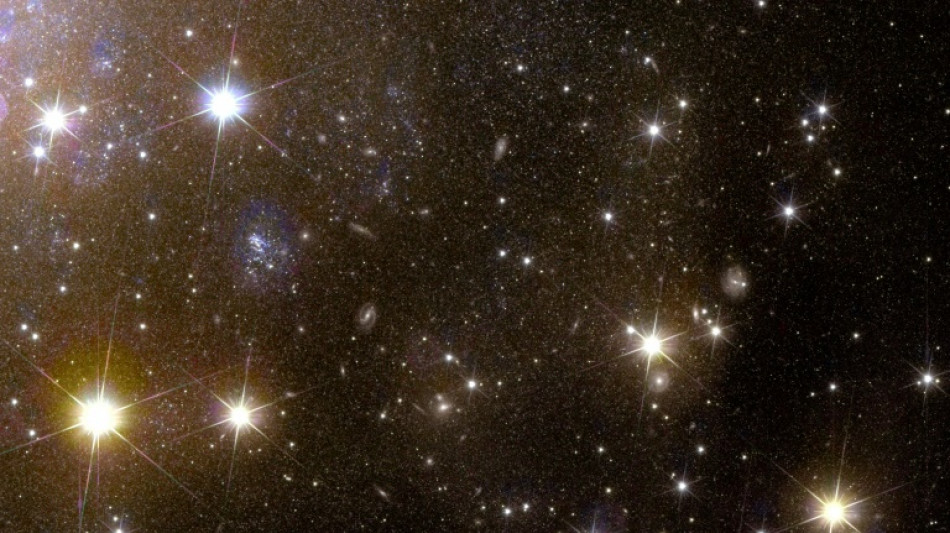
-
 Interim Venezuela leader to visit US
Interim Venezuela leader to visit US
-
Australia holds day of mourning for Bondi Beach shooting victims

-
 Liverpool cruise as Bayern reach Champions League last 16
Liverpool cruise as Bayern reach Champions League last 16
-
Fermin Lopez brace leads Barca to win at Slavia Prague

-
 Newcastle pounce on PSV errors to boost Champions League last-16 bid
Newcastle pounce on PSV errors to boost Champions League last-16 bid
-
Fermin Lopez brace hands Barca win at Slavia Prague

-
 Kane double fires Bayern into Champions League last 16
Kane double fires Bayern into Champions League last 16
-
Newcastle pounce on PSV errors to close in on Champions League last 16

-
 In Davos speech, Trump repeatedly refers to Greenland as 'Iceland'
In Davos speech, Trump repeatedly refers to Greenland as 'Iceland'
-
Liverpool see off Marseille to close on Champions League last 16

-
 Caicedo strikes late as Chelsea end Pafos resistance
Caicedo strikes late as Chelsea end Pafos resistance
-
US Republicans begin push to hold Clintons in contempt over Epstein

-
 Trump says agreed 'framework' for US deal over Greenland
Trump says agreed 'framework' for US deal over Greenland
-
Algeria's Zidane and Belghali banned over Nigeria AFCON scuffle

-
 Iran says 3,117 killed during protests, activists fear 'far higher' toll
Iran says 3,117 killed during protests, activists fear 'far higher' toll
-
Atletico frustrated in Champions League draw at Galatasaray

-
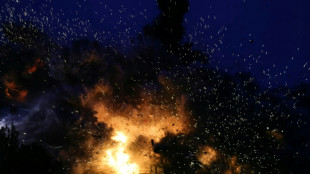 Israel says struck Syria-Lebanon border crossings used by Hezbollah
Israel says struck Syria-Lebanon border crossings used by Hezbollah
-
Snapchat settles to avoid social media addiction trial

-
 'Extreme cold': Winter storm forecast to slam huge expanse of US
'Extreme cold': Winter storm forecast to slam huge expanse of US
-
Jonathan Anderson reimagines aristocrats in second Dior Homme collection

-
 Former England rugby captain George to retire in 2027
Former England rugby captain George to retire in 2027
-
Israel launches wave of fresh strikes on Lebanon
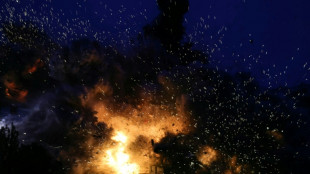
-
 Ubisoft unveils details of big restructuring bet
Ubisoft unveils details of big restructuring bet
-
Abhishek fireworks help India beat New Zealand in T20 opener

-
 Huge lines, laughs and gasps as Trump lectures Davos elite
Huge lines, laughs and gasps as Trump lectures Davos elite
-
Trump rules out 'force' against Greenland but demands talks

-
 Stocks steadier as Trump rules out force to take Greenland
Stocks steadier as Trump rules out force to take Greenland
-
World's oldest cave art discovered in Indonesia
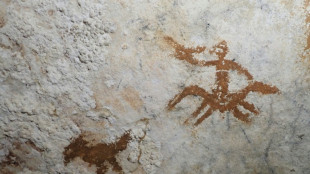
-
 US hip-hop label Def Jam launches China division in Chengdu
US hip-hop label Def Jam launches China division in Chengdu
-
Dispersed Winter Olympics sites 'have added complexity': Coventry
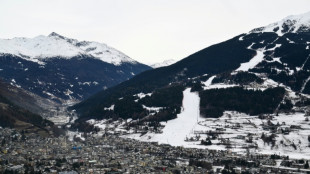
-
 Man City players to refund fans after Bodo/Glimt debacle
Man City players to refund fans after Bodo/Glimt debacle
-
France's Lactalis recalls baby formula over toxin
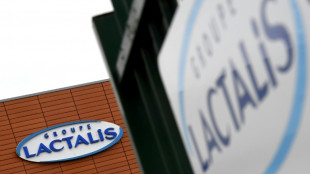
-
 Pakistan rescuers scour blaze site for dozens missing
Pakistan rescuers scour blaze site for dozens missing
-
Keenan return to Irish squad boosts Farrell ahead of 6 Nations

-
 US Treasury chief accuses Fed chair of 'politicising' central bank
US Treasury chief accuses Fed chair of 'politicising' central bank
-
Trump rules out force against Greenland but demands 'immediate' talks

-
 Israeli strike kills three Gaza journalists including AFP freelancer
Israeli strike kills three Gaza journalists including AFP freelancer
-
US Congress targets Clintons in Epstein contempt fight

-
 Huge lines, laughs and gasps as Trump addresses Davos elites
Huge lines, laughs and gasps as Trump addresses Davos elites
-
Trump at Davos demands 'immediate' Greenland talks but rules out force

-
 Australia pauses for victims of Bondi Beach shooting
Australia pauses for victims of Bondi Beach shooting
-
Prince Harry says tabloid coverage felt like 'full blown stalking'

-
 Galthie drops experienced trio for France's Six Nations opener
Galthie drops experienced trio for France's Six Nations opener
-
Over 1,400 Indonesians leave Cambodian scam groups in five days: embassy
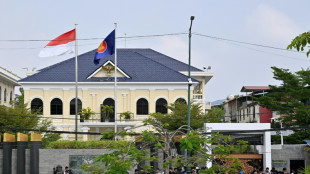
-
 ICC rejects Bangladesh's plea to play T20 World Cup matches outside India
ICC rejects Bangladesh's plea to play T20 World Cup matches outside India
-
Prince Harry says UK tabloid court battle in 'public's interest'

-
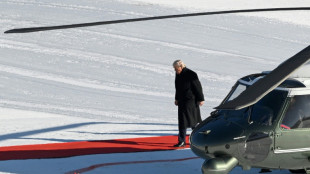 Trump lands in Davos to push Greenland claims
Trump lands in Davos to push Greenland claims
-
Balkan wild rivers in steady decline: study

-
 Injured Capuozzo misses out on Italy Six Nations squad
Injured Capuozzo misses out on Italy Six Nations squad
-
Mourners pay last respects to Italian icon Valentino


Creeping ice clouding vision of Europe space telescope Euclid
Scientists are trying to melt a thin layer of ice that is increasingly clouding the vision of the "dark universe detective" space telescope Euclid, the European Space Agency said on Tuesday.
It is the latest of several technical setbacks for the wide-eyed telescope, which blasted off into space in July on a mission to chart a third of the sky.
By doing so, the ESA hopes Euclid will reveal out more about the nature of dark matter and dark energy, which are thought to make up 95 percent of the universe but remain shrouded in mystery.
During checks in November, the team on the ground first noticed that they were losing a little light coming into the telescope's visible light imager, Euclid instrument operations scientist Ralf Kohley told AFP.
After digging into the data, they believe the problem is a layer of ice -- thought to be just the width of a strand of DNA -- that is building up on the telescope's optical surfaces.
"It's a big problem," Kohley acknowledged.
But researchers have been working on it, Kohley said, adding that he had no doubt Euclid would be able to finish its mission.
Keeping out water is a common problem for all spacecrafts.
Despite best efforts on the ground, a tiny amount of water absorbed during a spacecraft's assembly on Earth can smuggle its way to space.
Faced with the cold vastness of space, the water molecules freeze to the first surface they can -- in this case, some may have landed on the Euclid's mirrors.
- Thin ice -
Shortly after the telescope launched, scientists used its on-board heaters to heat up everything on the spacecraft, hoping to blast out any potential water.
This could be done again.
"But heating out everything is very disruptive for the mission," Kohley said.
Because heat expands most materials, warming up the whole spacecraft involves careful recalibration.
It would take at least a month to get the telescope back to its job surveying the sky, Kohley said.
So last week, the ESA started warming just two of the telescope's mirrors, turning the temperature up just enough to hopefully melt away the ice.
This "minimally invasive" partial warming will last until Thursday, Kohley said.
The scientists may not know if it works until mid-April.
Part of the problem is that the scientists do not know exactly where the ice is accumulating -- or how much there is.
And even if the scientists do manage to melt the ice, it could come back over time, Kohley warned.
If the partial warming plan fails, the ESA will have to heat up the whole spacecraft.
If the team have to do this every year during the telescope's planned-six year mission it could result in a six-month delay, Kohley said.
"But that's all speculation," he said.
"For the moment, we have to wait and see -- and hope we can rid of this problem in a more elegant fashion."
It is not the first problem for Euclid.
Cosmic rays previously confused the spacecraft's fine guidance sensor, which required a complicated software update.
Some unwanted sunlight also interfered with its observations, a problem solved by slightly rotating the telescope, Kohley said.
However nothing can be done about particularly strong solar flares occasionally projecting X-ray images on the visible imager.
Euclid, which the ESA calls its "dark universe detective," officially started its survey last month.
Its first images, released in November, revealed swirling galaxies bursting with colour in the distant cosmos.
S.Gantenbein--VB




